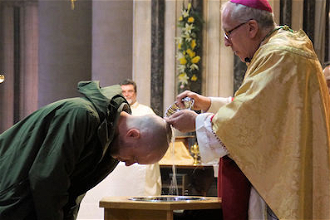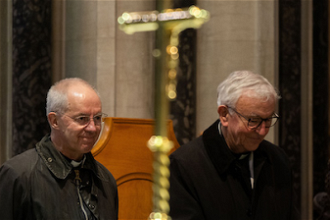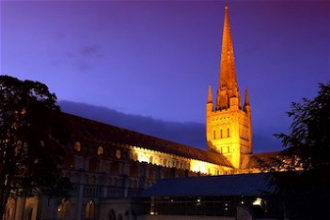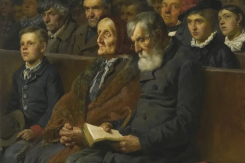Archbishop of Canterbury makes historic visit to Norwich's Catholic cathedral
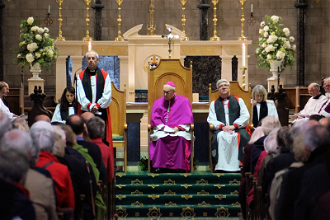
l-r: Archbishop Justin Welby, Bishop Alan Hopes, Bishop Graham James. Image Keith Morris
The Archbishop of Canterbury Justin Welby was welcomed to Norwich at an historic ecumenical service of welcome at St John the Baptist Catholic Cathedral yesterday (November 7).
He was welcomed by the Catholic Bishop of East Anglia and the Anglican Bishop of Norwich, alongside many other local church leaders in a short midday service of reconciliation. It is believed to be the first time any Archbishop of Canterbury has spoken at St John's Cathedral.
A 500-strong congregation heard Bishop Alan Hopes open the service with a word of welcome to Archbishop Justin: "The theme of your visit is reconciliation, so it is hugely significant that you have chosen to begin with an ecumenical act of worship. It speaks clearly of the journey we are all called to make in our search for that unity of the Body of Christ which is in accordance with his will and of the healing of the wounds of past divisions. May your visit bring fresh impetus to that journey for Christians in Norfolk."
The service included readings and prayers on the theme of reconciliation.
In his reflection, Archbishop Justin said: "Jesus' call to the church is to love one another and to be united," said Archbishop Justin. "The churches' answer to a divided world must be an example that comes from the unity of God in Christ that he has given us. Unity is not an added extra for the church. It is an inescapable duty and obligation.
"When I met him recently Pope Francis said: 'We must be more urgent in the ecumenism of action, proclaim the good news of reconciliation and love of the poor and challenge structures of sin and injustice.'
"We are united when we serve together in the foodbank or debt counselling or when we help the person sleeping rough.
"What is normal is a deep and abiding love for one another. We see an example of unity in this diocese in the relationship between Bishop Alan and Bishop Graham and between Catholics and Anglicans and other churches. I praise God for that and may it be an example that spreads further," said Archbishop Justin.
Ecumenical guests included leaders from Orthodox, Methodist, Baptist, and United Reformed churches, the Salvation Army, Quakers and free churches.
Later the same day, Bishop Alan joined Archbishop Justin Welby in speaking at an evening of reflection on reconciliation at a packed Norwich Anglican Cathedral.
The exploration of reconciliation, chaired by Bishop Graham James, also heard from Pastor Rolf Stahl from Koblenz, Norwich's German twin-town; Dr Marian Prinsley, President of the Norwich Hebrew Congregation; and Dee Robinson, of New Routes Integration, a refugee integration project in Norwich.
In front of a 500-strong audience, they discussed the need for reconciliation in post-war Germany, in a world peopled by record numbers of homeless refugees and in the treatment of the Jewish people in medieval Norwich and current day Pittsburgh.
Addressing religious divisions, Bishop Alan said: "Because our history is so intertwined, Christians should now take the lead in repudiating all forms of anti-Semitism or anti-Islamic activity. Reconciliation compels us to seek to forget the hostilities and differences of the past and work together towards mutual understanding and benefit in the future, as this can only lead to greater peace and justice in the world.
"For the Christian, reconciliation can only be achieved throughout the world when we all learn to love and accept the other specifically because we know that they too, just like us, are loved and accepted by God, who is the Father of us all."
Archbishop Justin brought the reflections to a close, drawing on his own personal experiences of reconciliation over many years in Africa and the Middle East and also in his own family life when his baby daughter Johanna was killed in a car crash.
"Reconciliation at its heart is the creation of a framework of living that enables disagreement to be transformed from violence to non-violence - that enables us to disagree well. In disagreeing well we respect the humanity of the other and we respect it more because we disagree. We are saying we take you seriously."
Reconciliation starts with seeing it as a possibility and with listening. It is a process and can go on for a long time, and it is deeply risky explained Archbishop Justin. "Pope Francis takes constant risks with reconciliation in the spirit of Nostra Aetate.
"A world in which reconciliation is something we seek and expect, a world in which we disagree with passion but never with violence, in which we put forward views with conviction but never with hatred, that is a liberated world," he concluded.



